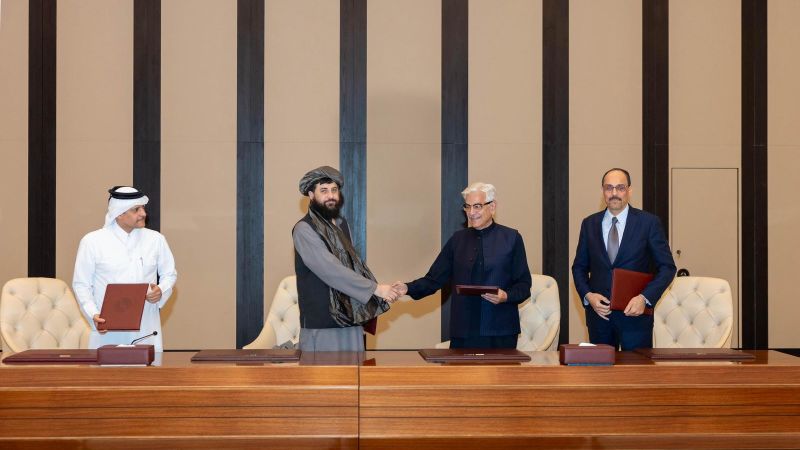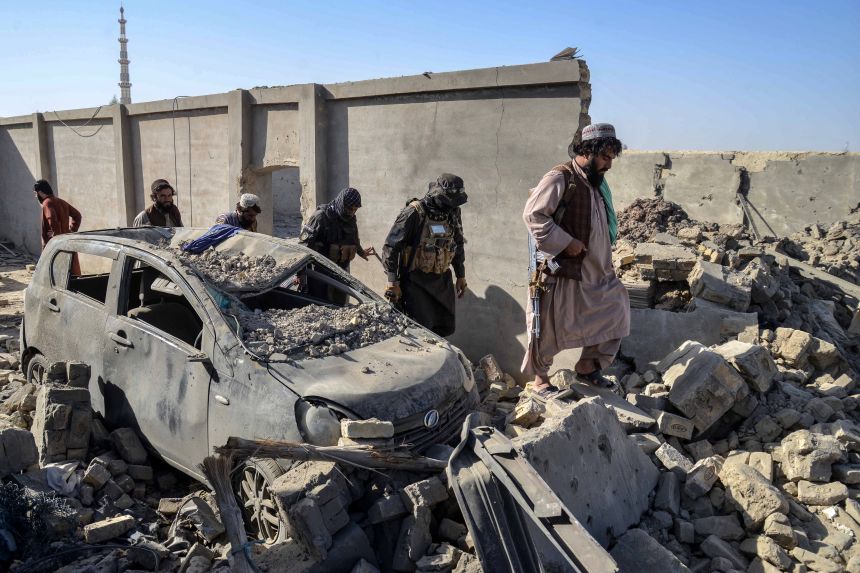
Pakistan and Afghanistan agree to new ceasefire after more than a week of deadly clashes
Pakistan and Afghanistan have agreed to a new immediate ceasefire during talks in Doha, Qatar’s foreign ministry said early Sunday, following more than a week of deadly clashes which continued despite an earlier truce.
Both countries agreed to stop fighting and work toward “lasting peace and stability” in talks mediated by Qatar and Turkey, the ministry said.
The announcement came after Afghanistan’s Taliban leadership accused Pakistan of conducting more airstrikes on its territory, in a continuation of the worst fighting between the two nations since the Taliban returned to power in Kabul in 2021.
Violence between the neighbors along their disputed, 1,600-mile border broke out on October 10 after Afghanistan first accused Pakistan of conducting airstrikes in Kabul and launched retaliatory attacks. Pakistan has long accused Kabul of harboring the Pakistani Taliban militant group (known as the TTP), which its Afghan namesake denies.
As part of the ceasefire agreement, Kabul agreed not to “support groups carrying out attacks against the Government of Pakistan,” while both sides would “refrain from targeting each other’s security forces, civilians, or critical infrastructure,” according to a statement from Taliban spokesperson Zabiullah Mujahid Sunday.
The countries had agreed to a 48-hour ceasefire Wednesday, after days of clashes which killed dozens of fighters and civilians on each side. The ceasefire was extended Friday amid plans for mediation, but violence continued.
Ahead of the talks Saturday, the Taliban confirmed a high-level delegation led by Afghanistan’s defense minister had departed for Doha. It accused Pakistani forces of conducting airstrikes on civilian areas in the border province of Paktika.
While Afghanistan “reserves the right to respond to these violations, in order to maintain the dignity and integrity of its negotiating team, its forces have been instructed to refrain from undertaking new military operations at this time,” Mujahid said in a statement at the time.
Pakistan’s information minister said that its security forces had struck “verified” camps of Islamist militants along the border, and rejected that it was targeting Afghan civilians.
“All speculations and assertions being made regarding targeting of civilians are false and meant to generate support for terrorist groups operating from inside Afghanistan,” Attaullah Tarar said in a post to X Saturday.
Tarar said the militants had attempted to attack Pakistan during the ceasefire period, but that Pakistan had repelled the attacks, killing more than 100 fighters. CNN could not verify the death toll or any targets.
The Afghanistan Cricket Board said eight people, including three cricket players, were killed in a Pakistani attack in Paktika, in a post to X Friday.
The players had been “targeted during a gathering” after returning home from a friendly cricket match, the board said.
Expressing its “deepest sorrow and grief,” the board announced Afghanistan would pull out of the three-nation T20I cricket tournament next month involving Pakistan, as well as Sri Lanka.
The fighting between the two countries in recent weeks marks the deadliest escalation since the US withdrew from Afghanistan in 2021, and could signal a new period of instability for the once-friendly neighbors.
Pakistan was one of the main backers of the Taliban after its ouster by NATO troops in 2001, and during its subsequent insurgency against the US-backed Afghan government.

But the TTP has re-emerged as one of Pakistan’s biggest national security threats, conducting 600 attacks against Pakistani forces in the past year, according to a recent report by the independent nonprofit Armed Conflict Location & Event Data (ACLED).
Since the recent clashes broke out, at least three dozen civilians have been killed and hundreds wounded in Afghanistan, the United Nations Assistance Mission in Afghanistan (UNAMA) said Thursday.
First Appeared on
Source link






